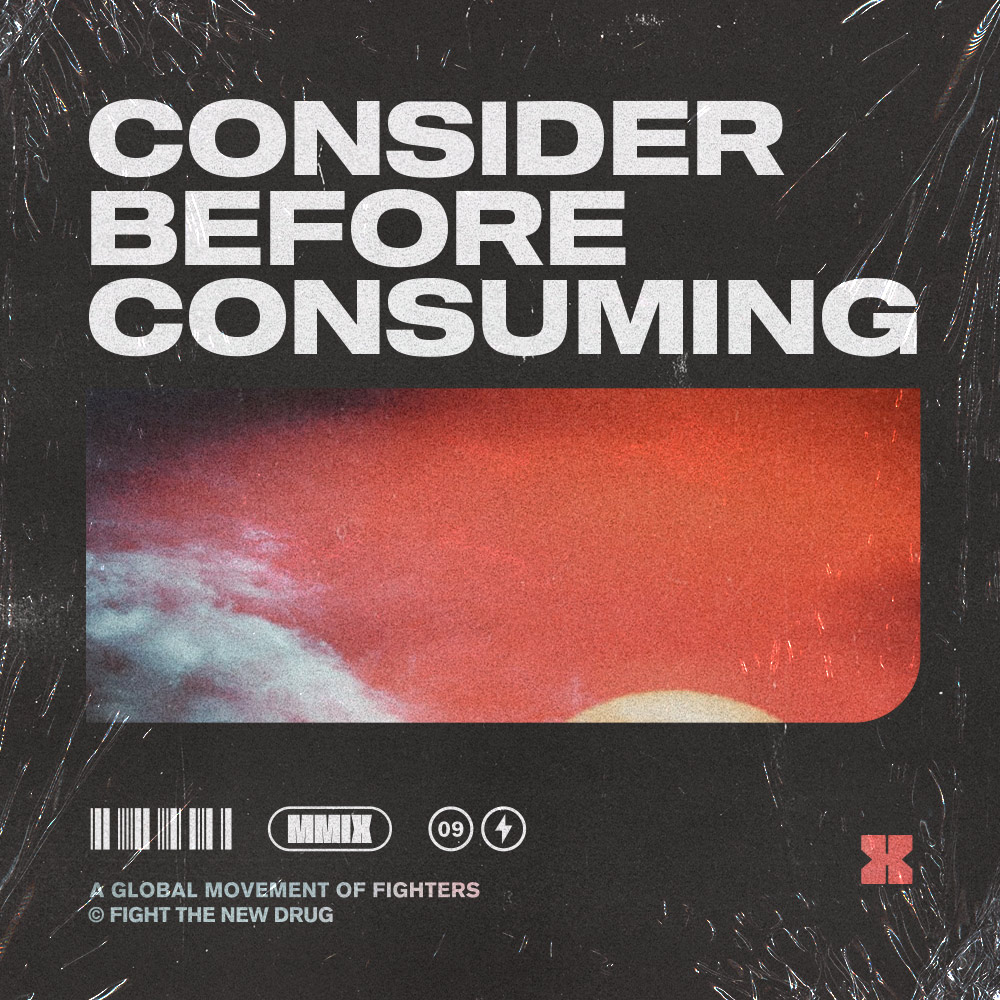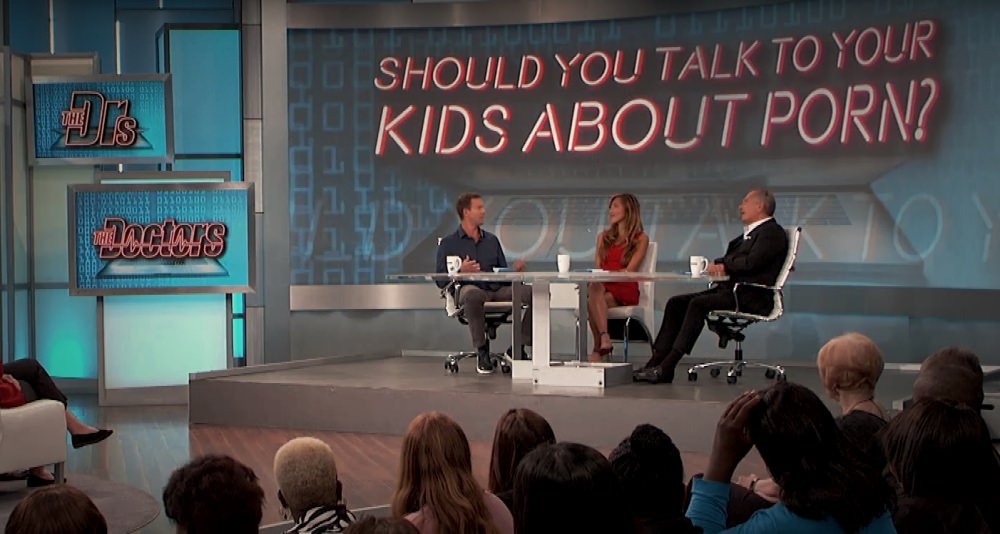Cover image screenshot from YouTube.com/TheDoctorsTv. 5-minute read.
In a world where porn is continually seen as a normal, healthy way to explore sexual fantasies and learn about sex, we’re always grateful to see its harms discussed on mainstream platforms.
Recently, award-winning daily talk show “The Doctors,” which features medical professionals discussing relevant and viewer-submitted health issues, spent an episode reviewing the legitimacy of the science behind porn addiction and how parents can deal with the “porn talk” with their kids in our digital age.
Check out a few clips from the show and see their interview with Founder of NoFap®, Alexander Rhodes, and clinical sexologist and psychotherapist Dr. Robert Weiss.
“I couldn’t not do it for a day”
Like many people, Alex’s struggle with porn began as a natural, healthy curiosity about women’s bodies and the human form, but it quickly spiraled into something completely different once he had been exposed multiple times to hardcore porn.
Hear his experience, here:
“You’re essentially depersonalizing the person in front of you,” Alex said. But is “porn addiction” a thing? Is it a real problem?
One of the arguments that critics of pornography and sex addiction often make is that “sex addiction” and “pornography addiction” aren’t official mental health diagnoses—and therefore, shouldn’t be given any credibility. Specifically, you may hear people say, “porn addiction isn’t even in the DSM, so it’s not a real addiction.” The “DSM” is the acronym people use to refer to the American Psychiatric Association’s (APA) Diagnostic and Statistical Manual of Mental Disorders. The DSM is a tool provided by the APA to help doctors, therapists, researchers and others (like insurance companies) diagnosis, label, and treat people with mental health issues.
Related: A Teen’s Brain Isn’t Fully Developed Yet, So How Does Hardcore Porn Affect It?
The truth is, many experts are confused as to why certain behavior addictions are being recognized within the DSM, while others are not. This is inconsistent, to say the least. Taken as a whole, many leading experts feel that it is only a matter of time before the DSM catches up with the facts that pornography can lead to addiction as well as other harmful effects—similar to tobacco in the late 19th century.
It is also important to note that although the DSM is seen as authoritative within the United States, there are other diagnostic manuals seen as more trustworthy internationally. For instance, the International Classification of Diseases and Related Health Problems (ICD), is the international “standard diagnostic tool for epidemiology, health management and clinical purposes.” The ICD is maintained by the World Health Organization (WHO), the coordinating authority for health within the United Nations System—and is the most widely used classification of mental disorders worldwide. [1]
Related: Quitting Porn? Learning The Brain Science Behind Compulsivity Can Be A Game-Changer
Several diagnostic codes to describe compulsive sexual behavior are in the ICD-10 and they have existed in the DSM since 1980. [2] Chapters on the neurobiology of sex and pornography addiction are also now appearing in updated psychiatry textbooks written by and for physicians. [3]
Clearly, the international medical field is moving in the direction of the preponderance of the neuroscience and other evidence—the facts can no longer be ignored. Doubt about the validity of pornography addiction as a risk for some users is rapidly fading, despite efforts to convince people otherwise.
So, many experts will tell you that the real answer to the question, “Is porn addiction in the DSM?” is not “no”—it is “not yet.”
The shame of teen porn compulsion and missing out on real relationships
“When we refine a pleasure, and make it so intense, some people are really going to struggle with it,” said Dr. Weiss.
Because teenagers are impulsive, plastic, learning machines, they are left especially vulnerable to the harms of pornography. Pornography triggers the reward system like a slot-machine jackpot of dopamine, creating strong neural pathways. The novelty-seeking impulse of teens is satisfied in the reward that consuming pornography brings, and considering that teenagers naturally have a higher addiction potential, this is extremely concerning.
See what the doctors have to say about how having porn as a sexual introduction can be detrimental:
As they discussed, because we know that porn changes the brain and shapes sexual tastes, the very plastic teenage brain is extremely susceptible to the negative effects of pornography. Without intervention before this critical period of brain plasticity ends, even regular or “normal” porn consumption could critically alter an adolescent’s brain and future sexuality.
The good news is that, though all these factors can be very negative in regards to pornography, they also can be really helpful!
If the brain is plastic enough to be altered by porn consumption, it can be plastic enough to be altered by not consuming porn! [4] Even in adults, the neural pathways shaped by pornography can be weakened, and in adolescents, because of their highly-plastic brains, this ability could be even stronger.
Related: Scientists Discover Brain Structure Differences In Frequent Porn Consumers
Likewise, because teenagers are learning machines, education about the harms of pornography and choosing not to consume pornography could have lasting impacts on future generations. If teenagers are given comprehensive information and resources about sex and pornography, perhaps they will be less compelled to turn to pornography for information about sex.
If you don’t talk to your kids about sex, porn will
Some of the greatest weapons to combat the normalization of porn in your home and society are education and awareness—and that includes face-to-face conversations that are open, honest, shame-free, and ongoing.
Research is showing how porn can really harm the consumer, their relationships, and the world. Fight the New Drug is all about getting these facts into the light, and equipping people to make educated decisions about watching porn. For some young consumers, it’s not a conscious decision to watch porn, because they stumble upon it or happen upon it by accident. This is how a lot of kids get exposed and potentially end up struggling with pornographic material by age 12, or younger.
Related: Huge Survey Reveals Parents Don’t Know About 80% Of What Their Teen Sees Online
And this is usually how a prolonged struggle starts.
This clip about what a parent absolutely should not do after stumbling on their child’s porn search history puts an emphasis on refraining from shaming, and we’re all for it.
We think it’s important for parents to talk to their kids about what porn is before they see it for the first time, and keep the conversation open, shame-free, honest, and loving. Instilling a total fear of porn in a young child may work for a short while, but it’s not a long-term help to keeping the lines of communication open. If kids feel their parents are open to listening to their struggles or questions, they’ll be more likely to approach the subject whenever it comes up instead of hiding their curiosity and searching for it on their own.
Related: For Parents: Your Child Just Told You They Struggle With Porn. Now What?
And to help curious minds from looking for answers in the wrong places, Fight the New Drug recommends tech-based solutions for anyone who needs help with web monitoring. This is why we highly recommend checking out our friends at Bark—an easy-to-use, smart tool that parents can use to help protect their children online. Bark uses a highly advanced algorithm to alert parents when it detects porn site visitation as well as potential threats.
Porn isn’t going away, but we can still fight
With constantly evolving technology, starting conversations about the harms of porn and the joys of real love and healthy sexuality is so important.
Porn isn’t going away, so it’s up to us to raise awareness on its harms and get educated on the issue. Nothing can completely erase its existence in our technological world, but with an open, shame-free dialogue and a scientifically-backed perspective, parents of the Playboy generation can help their kids of the PornTube generation navigate the online minefield they walk through daily.

Citations
[1] World Health Organizations. (2018). Classifications of diseases (ICD). Retrieved from http://www.who.int/classifications/icd/en/; International Statistical Classification of Diseases and Related Health Problems. (2018). ICD-11 for mortality and morbidity statistics (11th ed.) doi:https://icd.who.int/browse11/l-m/en; Luciano, M. (2015). The ICD-11 beta draft is available online. World Psychiatry, 14(3), 375–376. http://doi.org/10.1002/wps.20262
[2] Krueger, R. B. (2016). Diagnosis of hypersexual or compulsive sexual behavior can be made using ICD-10 and DSM-5 despite rejection of this diagnosis by the american psychiatric association. Society for the Study of Addiction, 111(12), 2110-2111. doi:https://doi.org/10.1111/add.13366
[3] Swann, A. C., Moeller, F. G., & Lijffijt, M. (2016). Neurobiology of addictions (1st ed.). Oxford, England: Oxford University Press.
[4] Doidge, N. (2007). The Brain That Changes Itself. (208-212) New York: Penguin Books.
Your Support Matters Now More Than Ever
Most kids today are exposed to porn by the age of 12. By the time they’re teenagers, 75% of boys and 70% of girls have already viewed itRobb, M.B., & Mann, S. (2023). Teens and pornography. San Francisco, CA: Common Sense.Copy —often before they’ve had a single healthy conversation about it.
Even more concerning: over half of boys and nearly 40% of girls believe porn is a realistic depiction of sexMartellozzo, E., Monaghan, A., Adler, J. R., Davidson, J., Leyva, R., & Horvath, M. A. H. (2016). “I wasn’t sure it was normal to watch it”: A quantitative and qualitative examination of the impact of online pornography on the values, attitudes, beliefs and behaviours of children and young people. Middlesex University, NSPCC, & Office of the Children’s Commissioner.Copy . And among teens who have seen porn, more than 79% of teens use it to learn how to have sexRobb, M.B., & Mann, S. (2023). Teens and pornography. San Francisco, CA: Common Sense.Copy . That means millions of young people are getting sex ed from violent, degrading content, which becomes their baseline understanding of intimacy. Out of the most popular porn, 33%-88% of videos contain physical aggression and nonconsensual violence-related themesFritz, N., Malic, V., Paul, B., & Zhou, Y. (2020). A descriptive analysis of the types, targets, and relative frequency of aggression in mainstream pornography. Archives of Sexual Behavior, 49(8), 3041-3053. doi:10.1007/s10508-020-01773-0Copy Bridges et al., 2010, “Aggression and Sexual Behavior in Best-Selling Pornography Videos: A Content Analysis,” Violence Against Women.Copy .
From increasing rates of loneliness, depression, and self-doubt, to distorted views of sex, reduced relationship satisfaction, and riskier sexual behavior among teens, porn is impacting individuals, relationships, and society worldwideFight the New Drug. (2024, May). Get the Facts (Series of web articles). Fight the New Drug.Copy .
This is why Fight the New Drug exists—but we can’t do it without you.
Your donation directly fuels the creation of new educational resources, including our awareness-raising videos, podcasts, research-driven articles, engaging school presentations, and digital tools that reach youth where they are: online and in school. It equips individuals, parents, educators, and youth with trustworthy resources to start the conversation.
Will you join us? We’re grateful for whatever you can give—but a recurring donation makes the biggest difference. Every dollar directly supports our vital work, and every individual we reach decreases sexual exploitation. Let’s fight for real love:




